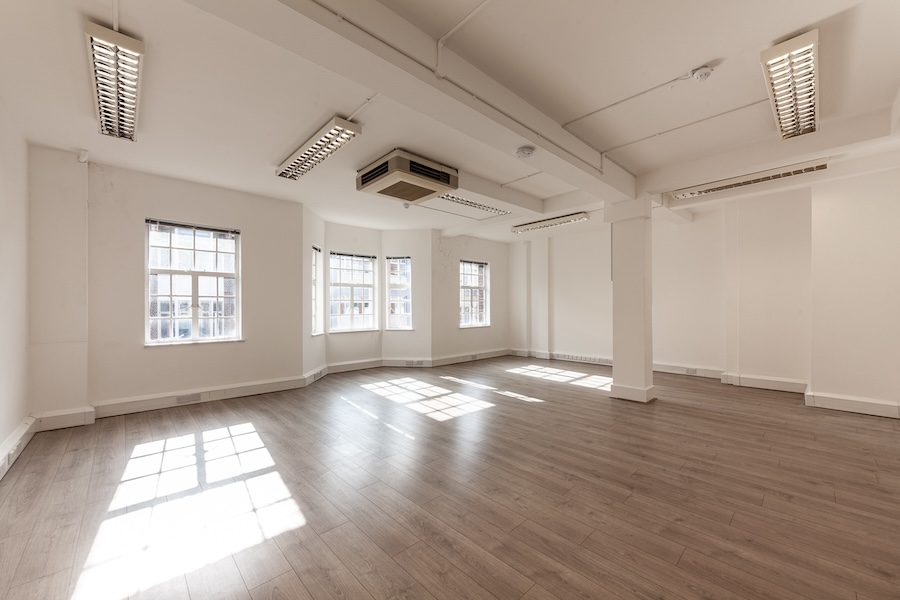There are multiple ways a company can search for and find an office space — and the method you choose will depend on your specific business needs.
To help make life a little easier, Hubble’s outlined the three core methods below:
- Factors to consider as part of your search
- Traditional tenant reps
- Flexible workspace providers
- Going direct to providers

Factors to consider as part of your search

Before we get into it, it’s worth exploring the factors you should consider before you start an office search.
After all, no office search is the same; it’ll greatly depend on your business needs and preferences, so going over the factors will help point you in the right direction. They are as follows:
Office type
Nowadays, you can choose from various office types — and the one you pick will determine whether to use a flexible workspace provider or a traditional tenant rep to find it. These include:
- Serviced Offices: A private office ready to go from the day you move in, with all-inclusive fees and facilities. These can either be full-time or part-time flexible rentals starting from one month.
- Managed Offices: A private, “blank canvas” space customised to the tenant’s liking, with all-inclusive fees and facilities. These rentals are still flexible but slightly longer, starting from one year.
- Leased Offices: A traditional, private office space rented directly from the building’s landlord, delivered in CAT A condition. Tenants are in total control over the fit-out and costs, with contracts starting from 3 years.
- On-Demand Workspaces: A combination of coworking spaces, day offices, and meeting rooms to book by the day or hour, with no contracts needed.
Viewings
Viewings are an integral part of finding a new office space. It’s the perfect opportunity to assess a range of things, including the quality of the building, local amenities, and whether or not you can visualise your team being there.
You can either organise these viewings yourself or use a third party — like a flexible workspace provider — to manage the process for you.
Admin work
When searching for the perfect office, you’ll create a shortlist with at least three or four potential options.
Of course, this requires a hefty amount of admin work. You’ll need to speak to multiple workspace providers at the same time and note down the key points of differentiation to narrow down your options.
You’ll also need to liaise with multiple stakeholders to establish which office is the perfect fit. This can be time-consuming, especially if you don’t have an office space expert to help guide you.
Employees’ preferences
As is the case with making any big business decision, it’s important you take your teams’ workspace preferences into account. This can work wonders for boosting productivity and engagement.
While this can boost employee satisfaction and productivity, it also ensures that whichever office space you opt for, you get your money’s worth.
By understanding how your employees intend to use the workspace, you’re able to optimise it. Whether it’s renting a smaller, part-time office or a large one to cater for your entire workforce, surveying your team can lead to cost savings and stronger levels of employee engagement.

Additional costs
Just as you scrutinise every detail during office viewings, it’s crucial to enquire about any additional office relocation costs before you sign a contract.
These include things like moving relocation services, additional amenities, deposit, WiFi, and branding capabilities.
Traditional tenant reps

Traditional tenant representatives (tenant reps) are commercial real estate brokers who exclusively represent tenants searching for traditional office space, like leased offices.
From conducting market research to reviewing leasehold agreements, they focus entirely on the tenant’s needs and ensure their best interests are prioritised, helping cut costs and secure better terms.
What are the pros and cons?
| Pros | Cons |
| Established and Trustworthy Brands When searching for office space in this part of the industry, you’ll be dealing with large, established, and trusted companies that have a proven track record in the space. | Focus on Long-Term Leases for Big, Established Businesses Landlords in this space typically specialise in long-term leases (5+ years), requiring businesses to commit to a fixed amount of space and cost for an extended period. This arrangement is unsuitable for companies with fluctuating headcounts or those with dispersed operations. |
| Broad Understanding of the Leasehold Market Tenant reps and agents bring their knowledge and expertise to the table, helping guide you on decisions you may not be best educated on. | Finder’s Fees These agents typically charge a finder’s fee (around 10% of your first year’s rent) and will likely require you to sign an exclusivity agreement. Leasehold space is usually secured for five years, with an option to break the lease after three years. |
| Good Negotiating Skills A traditional tenant representative has solid experience and expertise in negotiating lease terms, helping you get a deal on your office space. | Paying For the Fit Out Since leased spaces are fully customisable, the tenant must pay for the fit-out and manage the space themselves, including rates, utilities, internet, cleaning, and repairs. |
Flexible workspace providers

Flexible workspace providers — like Hubble — offer an alternative to long-term lease options by providing shorter-term solutions. These allow companies to scale their office space up or down depending on their needs and make quick changes without hefty exit fees or disruptions.
These workspace solutions — such as full-time and part-time offices — are designed to remove the hassle of office management. The spaces are typically fully furnished and offer all-inclusive amenities and utilities, all packaged into one simple monthly bill.
Tenants can usually kickstart their search for flexible office space by browsing for options on an online marketplace. From there, they can create a shortlist, book viewings, and contact a Tenant Advisor to manage the entire process, including sending recommendations and handling viewings.
Flexible workspace providers usually have strong relationships with premium workspace brands — such as WeWork, Huckletree, and Fora — meaning tenant advisors can negotiate the best deal.
| Pros | Cons* (read about how Hubble tackles the cons below) |
| Greater Flexibility Flexible workspace providers offer offices with more flexibility than traditional leases, i.e. flexible licence agreements starting at one month through to 3 years in term. | Risk of Third Party Sharing There are some providers out there who share your details with third parties, so you end up dealing with a lot of calls and emails. |
| Broader Range of Workspaces Serviced office brokers offer a wide variety of workspaces under one roof, allowing you to explore numerous providers in a single location. | Risk of Hidden Pricing and Fees With some providers, there’s a risk they won’t give accurate information and pricing up-front, so you have to enquire to get the information you want. |
| Advisory Service Available Serviced office brokers typically provide advisory services, offering an expert who can assist you in navigating the market and finding a new office. | Risk of Outdated Listings Some providers use outdated listings as a ‘bait and switch’, meaning they’ll show attractive offers that are no longer available, only to then try to sell you something different and often less desirable. |
| Managed Office Space Available Flexible workspace platforms bridge the gap between serviced offices and leasehold space, so longer-term and customisable managed offices are available — with inclusive rates. | Concerns over Market Access Some flexible office space brokers don’t have access to the entire market. Ideally, you’ll want one that has contracts in place with all the UK’s flex space, including managed operators. |
How to find a flexible workspace provider you trust
Flexible workspace providers are the easiest and most hassle-free way of finding a new office. But how can you mitigate the risks and find a trustworthy platform?
Of course, you’ll need to do your due diligence and research the company extensively. Start by looking at reviews on Trustpilot or Google to gauge customer satisfaction levels.
Then, scour the website for green and red flags. For example, is there a live chat feature? Is the website usable and easy to understand? Have the listings got clear and up-to-date images?

At Hubble, we take pride in simplifying the process of finding an office, not complicating it.
Our flexible workspace platform features only genuine listings with fully transparent pricing and information. We guarantee that your details will never be shared with third parties, and our advice is always pressure-free. Take a look at our website for more information!
Going direct to providers

Finally, there’s the option of going directly to providers. This means contacting the workspace provider’s sales teams to find and negotiate office space, bypassing tenant reps or marketplaces like Hubble.
This approach allows you to handle the negotiations yourself. And if a flexible workspace platform charges brokerage fees, you can also save money by handling the entire process yourself.
| Pros | Cons |
| A Strong Relationship with the Provider Since you’d be dealing with your potential new provider directly, you can get more of a feel for them and their team. | More Admin and Hassle You’ll need to do all the legwork, research, and contact different providers. If you contact multiple spaces directly, you’ll deal with multiple salespeople. |
| You’ll Be in the Detail As you’re managing the entire process by going straight to a provider, you can be more in the detail of booking viewings, getting answers to questions and negotiating on a deal. | Less Access to Market Expertise Since you’ll be dealing with a salesperson at each space, rather than an expert in the office landscape, advice will be less specialised. |
| Current Listings Similar to a flexible workspace provider, going directly means you’ll see their available office spaces right away. | No Help Negotiating You’ll have to do all your negotiating yourself, rather than getting help (as you would with a broker like Hubble), which means you could miss out on a better deal.. |
How Hubble can help
So, there you have it — the core three ways a business can find an office space.
At Hubble, we help businesses give their teams great places to work. On our easy-to-use platform, you can easily find an office space via our three workspace solutions: Full-Time Offices, Part-Time Offices, and Hubble On-Demand.
While you browse for office space, create shortlists, and book viewings, our expert team of Tenant Advisors will send you recommendations, attend viewings, and negotiate the very best deal on your behalf — all free of charge.
So, if you’re looking for your next flexible workspace and you’d rather have an expert take care of the process, don’t hesitate to reach out!
